Abstract
We conduct an experimental study of the effects of manipulations (i.e., dishonest behaviors) including those of manipulation by annexation and merging in weighted voting games. These manipulations involve an agent or agents misrepresenting their identities in anticipation of gaining more power at the expense of other agents in a game. Using the well-known Shapley-Shubik and Banzhaf power indices, we first show that manipulators need to do only a polynomial amount of work to find a much improved power gain, and then present two enumeration-based pseudopolynomial algorithms that manipulators can use. Furthermore, we provide a careful investigation of heuristics for annexation which provide huge savings in computational efforts over the enumeration-based method. The benefits achievable by manipulating agents using these heuristics also compare with those of the enumeration-based method which serves as upper bound.
Access this chapter
Tax calculation will be finalised at checkout
Purchases are for personal use only
Preview
Unable to display preview. Download preview PDF.
References
Alonso-Meijide, J.M., Bowles, C.: Generating Functions for Coalitional Power Indices: An Application to the IMF. Annals of Operations Research 137, 21–44 (2005)
Aziz, H., Bachrach, Y., Elkind, E., Paterson, M.: False-name manipulation in Weighted Voting Games. Journal of Artificial Intelligence Research 40, 57–93 (2011)
Aziz, H., Paterson, M.: False-name Manipulations in Weighted Voting Games: splitting, merging and annexation. In: 8th International Conference on Autonomous Agents and Multiagent Systems, Budapest, Hungary, pp. 409–416 (2009)
Aziz, H., Paterson, M., Leech, D.: Classification of Computationally Tractable Weighted Voting Games. In: Proceedings of the World Congress on Engineering, London, U.K., vol. I (2008)
Bachrach, Y., Markakis, E., Procaccia, A.D., Rosenschein, J.S., Saberi, A.: Approximating Power Indices - Theoretical and Empirical Analysis. Autonomous Agents and Multiagent Systems 20(2), 105–122 (2010)
Banzhaf, J.: Weighted Voting Doesn’t Work: A Mathematical Analysis. Rutgers Law Review 19, 317–343 (1965)
Bilbao, J.M., Fernandez, J.R., Losada, A.J., Lopez, J.J.: Generating functions for computing power indices efficiently. TOP: An official Journal of the Spanish Society of Statistics and Operations Research 8(2), 191–213 (2000)
Brams, S.J.: Game Theory and Politics. Free Press, New York (1975)
Brams, S.J., Affuso, P.J.: Power and Size: a new paradox. Theory and Decision 7, 29–56 (1976)
Deegan, J., Packel, E.W.: A New Index of Power for Simple n-Person Games. International Journal of Game Theory 7, 113–123 (1978)
Fatima, S.S., Wooldridge, M., Jennings, N.R.: A Randomized Method for the Shapely Value for the Voting Game. In: AAMAS, Hawaii, pp. 955–962 (2007)
Felsenthal, D.S., Machover, M.: The Measurement of Voting Power: Theory and Practice, Problems and Paradoxes. Edward Elgar, Cheltenham (1998)
Felsenthal, D.S., Machover, M.: Annexation and Alliances: When Are Blocs Advantageous a Priori. Social Choice and Welfare 19(2), 295–312 (2002)
Ghallab, M., Nau, D., Traverso, P.: Automated Planning - Theory and Practice. Morgan Kaufmann Publishers (2004)
Holler, M.J., Packel, E.W.: Power, Luck and the Right Index. Journal of Economics 43, 21–29 (1983)
Johnston, R.J.: On the Measurement of Power: Some Reactions to Laver. Environment and Planning 10, 907–914 (1978)
Laruelle, A.: On the Choice of a Power Index. Instituto Valenciano de Investigaciones Economicas 2103, 99–10 (1999)
Lasisi, R.O., Allan, V.H.: Annexations and Merging in Weighted Voting Games - The Extent of Susceptibility of Power Indices. In: 3rd International Conference of Agents and Artificial Intelligence (ICAART), Rome, Italy, pp. 124–133 (2011)
Lasisi, R.O., Allan, V.H.: A Search-based Approach to Annexations and Merging in Weighted Voting Games. In: 4th International Conference of Agents and Artificial Intelligence (ICAART), Vilamoura, Algarve, Portugal, pp. 44–53 (2012)
Leech, D.: Voting Power in the Governance of the International Monetary Fund. Annals of Operations Research 109(1), 375–397 (2002)
Matsui, T., Matsui, Y.: A Survey of Algorithms for Calculating Power Indices of Weighted Majority Games. Journal of the Oper. Res. Society of Japan 43(1) (2000)
Matsui, Y., Matsui, T.: NP-completeness for calculating power indices of weighted majority games. Theoretical Computer Science 263(1-2), 305–310 (2001)
Shapley, L.S., Shubik, M.: A Method for Evaluating the Distribution of Power in a Committee System. American Political Science Review 48, 787–792 (1954)
Shehory, O., Kraus, S.: Methods for Task Allocation via Agent Coalition Formation. Artificial Intelligence 101(1-2), 165–200 (1998)
Yokoo, M., Conitzer, V., Sandholm, T., Ohta, N., Iwasaki, A.: Coalitional Games in Open Anonymous Environments. In: AAAI, pp. 509–515 (2005)
Author information
Authors and Affiliations
Editor information
Editors and Affiliations
Rights and permissions
Copyright information
© 2013 Springer-Verlag Berlin Heidelberg
About this paper
Cite this paper
Lasisi, R.O., Allan, V.H. (2013). Manipulation of Weighted Voting Games via Annexation and Merging. In: Filipe, J., Fred, A. (eds) Agents and Artificial Intelligence. ICAART 2012. Communications in Computer and Information Science, vol 358. Springer, Berlin, Heidelberg. https://doi.org/10.1007/978-3-642-36907-0_24
Download citation
DOI: https://doi.org/10.1007/978-3-642-36907-0_24
Publisher Name: Springer, Berlin, Heidelberg
Print ISBN: 978-3-642-36906-3
Online ISBN: 978-3-642-36907-0
eBook Packages: Computer ScienceComputer Science (R0)

